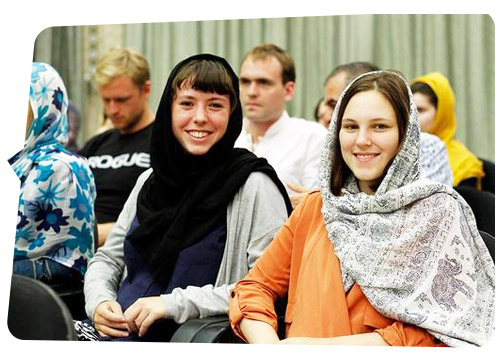With professional instructors that are fluent in both Farsi and English, you can learn Persian online and become fluent in under 6 months. Discover the easiest way to learn Persian online. Our private tutors will help you learn Persian online master the language from beginner to native proficiency.
check visaList
Who needs to learn Farsi:

Learn Farsi basics, get to know your instructor & become familiar with Iranian culture
Choose your own schedule, set study goals and track your progress, no matter your level.
Our tutors are college professors, lifelong teachers and passionate instructors

Apply for your visa and choose the welcome package to get a %10 discount
Free Visa Authorization Code
24/7 Live Assistance
SIM-Card
50,000 Rials credit + 10GB internet
30 Days Travel Insurance
10,000 Euros coverage
Airport Transfer
IKA to hotel in Tehran
Before you learn Persian online, learn more about the language by clicking one of the three tabs below
Native speakers are extremely enthusiastic about teaching you. It is not a hard language to learn how to speak, once you master a few unique sounds that is. But once you are on a roll, it will come really easy. Plus the community is extremely supportive of new language learners so you can find support easily. So, is Farsi hard to learn? Not if you have the right support.
Persian is the dialect of Farsi spoken in Iran. As a language, it is easy to pick and use. Native speakers will often encourage you when they hear you trying so it will be easy to immerse yourself in the language.
The fastest way to learn Persian online, just like learning another language, is to get a private tutor that is a native speaker of the language you are trying to learn. That’s exactly what TAP Persia does in our online Farsi classes. We connect you with professional instructors with 10+ years of experience that are also fluent in English, helping you completely immerse yourself in the Fari language.
The fastest way to learn to speak Farsi is to get a private tutor that is a native speaker. TAP Persia’s online Farsi classes connect you with professional instructors with over 10 years experience to help you completely immerse yourself when you learn Persian online.
Farsi is definitely not a dying language. It is spoken as an official language in Iran, Afghanistan, Tajikistan. Farsi traces its roots in the lands formerly part of ancient Persian empires.
The fastest way to learn how to speak Persian is to get a personal private tutor. TAP Persia offers private online classes with professional teachers with 10+ years of experience for a fraction of what other platforms charge.
If you are familiar with Iranian culture or thinking about traveling to Iran, or if you are interested in ancient languages and classical poetry, you can learn Persian online with a personal tutor.
It will take you 2-3 months to learn Farsi. In this time, you will be able to recite simple phrases and have basic conversions. After about 5-6 months, you should be able to have more complicated conversations. But of course, it all depends on how much effort you put into learning and getting immersed in the language.
There are many more Arabic speakers than Farsi speakers. Farsi is mostly spoken in Iran while Arabic is spoken throughout the entire Middle East. If you want to learn a language with broader reach, go for Arabic. If you want to dive deeper into Iranian culture, poetry and history, Persian is the language for you.
It is a lot easier to learn Farsi if you already know Arabic. The alphabet, sentence structures and words share many similarities.
Farsi speakers can understand some Arabic words and phrases but cannot have full-blown conversations.
Yes, Persian is older than Arabic by several hundred years. Old Persian had been around since 550-330 BC. Old Arabic on the other hand, emerged in the 1st century CE.
Arabic is very different from the Farsi language. While they do share the same alphabet and root words, the languages are structurally and historically different. Arabic is a much more complicated language while Farsi has adapted multiple other languages into its own.
Farsi is an easier language to learn than Arabic because it is structurally simpler, related to other Romantic languages and even has several loan words from global languages.
Iranians usually say “Salam” or “Dorood” when they want to say “Hello”.
Iranians use “Merci”, “Sepas” or “Tashakor” to say “Thank you”. Merci is a French loan word.
“Chetori?” means “How are you?” in Farsi. It is often used as a greeting in the beginning of conversation such as “Salam! Chetori?” to mean “Hey! How are you?”
“Khoobam” means “I’m good” and is usually used in response to “Cheotri?” which means “How are you?”.
“Eshgham” means “My love” or “Babe” in Farsi. It is usually said to a very close friend or lover.
“Azizam” means “My dear” in Farsi. It is normally used with friends, family and anyone you have a friendly relation with.
If you want to call your lover “Babe” or “My love” you can use the expression “Eshgham”.

We help you apply for Farsi language courses at the Saadi Foundation, Isfahan University, or other accredited institutions in Iran. For further info, start chatting with us through our website or WhatsApp. Read more about the application process.

A lot of people get confused when it comes to this ancient Iranian language. Should I learn Persian or Farsi? The answer is both. Technically speaking, Persian is the language of the nation of Persia, which was renamed to Iran in 1935. Although the term has not been in use in decades, the word still refers to the language of the lands of the former Persian empires. The language is known as Farsi (فارسی) to native speakers in Iran, Dari (دری) in Afghanistan, and Tajik (тоҷикӣ) in Tajikistan. Currently, the world has about 110 million Persian speakers. It is also the official language of Iran & Tajikistan and Afghanistan.
The most popular and widely used version of Persian is Farsi. The language has gone through several versions in the past several thousands years, most notably into Old Persian, Middle Persian and Modern Persian, the most current form of Faris. The language is written right to left, is adapted from the arabic alphabet and features many words from the Arabic language.
We know learning a new language can be challenging. It’s a whole journey. That’s why we believe you shouldn’t go alone. TAP Persia Farsi classes online are conducted one-on-one with private instructors who will not only teach you the fundamentals but help you communicate with an actual native speaker. TAP Persia provides an immersive learning environment that creates connections and stimulates deeper learning.
One of the first concerns that most first-timers ask is if speaking Farsi difficult? The grammatical structure of Perisan is subject-object-verb instead of the English structure of subject-verb-object. There are some phonemes or sounds, like [x] /خ/ and [Ɣ] /ق/, that don’t exist in English. At the same, Farsi does have several points that make it easier to learn. Persian does not have any genders and most modern terms, especially when it comes to tech and business, are borrowed from English. Also if you are familiar with Arabic, you will easily be able to grasp the structure and majority of the vocabulary of Farsi.
The Persian language is case-free and has 32 letters. The letters are written in individual and connected forms and are broken down into smaller groups for easier understanding. You will also come to realize that various letters have similar sounds.
That’s why TAP Persia offers one-on-one Farsi classes online that introduce you to the language through a real native speaker. You will learn common language words and conversational phrases. This method allows users to feel the confidence of working with a real human being. The emphasis is always on understanding and being understood by native speakers, not on memorizing long vocabulary lists.
Being able to pronounce the words correctly is one of the key goals of a language class. If your goal is to understand and be understood by native speakers, then you have to focus on having conversations rather than just memorizing a list of words and phrases. If you focus on pronunciation, you will have much better confidence when it comes to every conversation.
Farsi is an intonational language , meaning that the rise and fall of your voice or the pitch can determine meaning. There are four pitches in Farsi: high pitch for new information, low pitch for information already given, low followed by high pitch to indicate contrast, and another variation of low and high pitches that expresses doubt. There are also two major intonation patterns in Persian and, like English, the rise and fall of tones in a sentence can help you determine the difference between a question and a statement. However, unlike English, Persian is a syllable-timed language, and English speakers may have trouble adjusting at first to the natural rhythm of Farsi.
TAP Persia believes that mastering pronunciations is the key to your confidence. We set you up with a private tutor that helps you not only master the pronunciations but answer any questions you may have. Discover the difference a real life human can make when it comes to Persian lessons online.
Once you have mastered key pronunctions, its time to focus on learning the essential Persian language words and commonly used phrases that will help you do what language was made for: having everyday conversations. You should focus less on vocabulary acquisition and more on making the language a small but consistent part of you daily schedule.
If you fall into any of the following categories, learning the Persian language can be helpful for you:
Planning on traveling to Iran or the Middle East
Encounter Iranian culture as part of your business
Studying Middle Eastern culture, religions, or languages
Have Iranian friends or family
Learning a new language helps you have a whole new perspective on life. Persian is also one of several classical languages such as Greek and Hebrew that are still around today. These languages and their respective cultures have shaped civilization for thousands of years. And then of course there is the satisfaction of having conversations with native speakers.
If you are interested to come to Iran and study Persian in one of the Iranian institutes or Universities like Isfahan university, just contact us and we will give you all information regarding the student visa process.